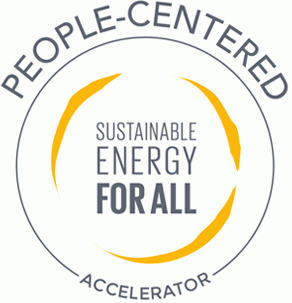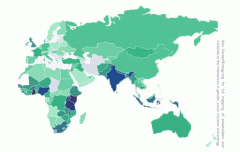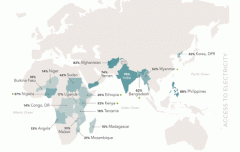New report: Equity, Energy and Economic Empowerment: 6 Global Trends Critical to Closing Gender-Related Energy Access Gaps
Lisbon, Portugal – A new study released today at the Sustainable Energy for All Forum examines the implications of global trends for energy access, gender equality, and social inclusion.
The report, Levers of Change: How Global Trends Impact Gender Equality and Social Inclusion in Access to Sustainable Energy, looks at key emerging issues – such as proliferating use of mobile money financing and declining decentralized renewable energy technology costs – and the extent to which women are able to leverage these trends so that they can gain access to electricity, clean cooking, and other sustainable energy solutions.
The report’s research indicates that women have fewer chances to gain energy access and, as a result, are at higher risk of being left behind as sustainable energy solutions take stronger hold in Africa and other regions with significant energy access gaps. Women are less likely, for example, than men to have mobile phones, which create opportunities for using mobile money financing to acquire home-based solar systems.
There is significant work underway to promote gender responsive and socially inclusive approaches to energy access through women’s empowerment and engagement in the energy sector, as well as on climate change mitigation and adaptation. Current and emerging socio-economic trends will greatly influence decisions on how energy is delivered and financed and the roles of women and men. An improved understanding of such trends can help inform decisions on policy and finance that can enhance the delivery of 2030 goals and ensure no one is left behind.
Levers of Change was produced by Sustainable Energy for All and ENERGIA, International Network on Gender and Sustainable Energy. It is a project of the ENERGIA Gender and Energy Research Programme, a 5-year DFID funded research programme on gender and energy in 12 countries, and of the SEforALL People-Centered Accelerator to Advance Gender Equality, Social Inclusion and Women’s Empowerment in the Sustainable Energy Sector.
“This report is a wakeup call about the many ways that women are not getting an equal chance to participate – and drive – the sustainable energy movement,” said Caroline McGregor, Lead Energy Access and Gender Specialist at Sustainable Energy for All. “Hopefully, the findings will help shift mindsets on new energy access strategies that can maximize benefits for men and women alike.” "
This study provides a view into the dynamic context for current knowledge on gender and energy, such as the new evidence being developed through the ENERGIA research programme says Annemarije Kooijman, Gender and Energy Research Programme Coordinator at ENERGIA. “It thereby provides valuable input for shaping policy recommendations, not only for ENERGIA's own strategy going forward and the next phase of our research programme, but also for policymakers and practitioners in the energy sector or sectors linked to the highlighted gendered impacts."
Among the research findings highlighted by the report:
- The expansion underway of off-grid and mini-grid energy access solutions presents new opportunities to close gender and social inclusion gaps by reaching those not served by the grid.
- With improving technology and increasing scale, energy services are becoming less expensive and consumer financing packages from DRE companies help to put connections within reach.
- Mobile money and other digital innovations can be leveraged to propel women’s access to off-grid and clean cooking solutions, as well as their entrepreneurship.
- The upward trend in women’s entrepreneurship is an opportunity to expand energy access by empowering women to help close the access gap at the last mile, reaching those who wouldn’t be reached by business-as-usual approaches.
- Securing reliable electricity and clean cooking access for women and men living in slums and peri-urban areas enables livelihoods, as well as the legitimacy and economic contribution of urban settlements.
- With the growing crisis of displaced persons, humanitarian agencies can deliver improved service to residents by shifting away from reliance on expensive diesel-generated power toward renewable-powered electricity and by providing clean cooking solutions to pre-empt the need for residents to collect firewood.
The report also looks closely at how these trends are playing out and being handled in five key countries – Nigeria and Tanzania in Africa, Bangladesh and Myanmar in Asia and Haiti in the Caribbean – which all face significant energy access challenges. This report is also expected to help shape the strategic interventions of the SEforALL People-Centered Accelerator as it works to advance gender equality, social inclusion and women’s empowerment in the energy sector, as well as ENERGIA’s strategic forward-looking work plan.
Read the report here.
image credit: ENERGIA




